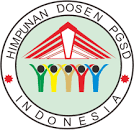RESPONS MAHASISWA TERHADAP PENGEMBANGAN INOVASI PEMELAJARAN PROBLEM BASED LEARNING MELALUI PENDEKATAN EXPERIENTIAL LEARNING DALAM MENINGKATKAN KEMAMPUAN MENGAPRESIASI BAHASA DAN SENI MENUJU LITERASI MENULIS
Abstract
Penelitian ini dilatarbelakangi oleh keadaan rendahnya minat dan motivasi mahasiswa dalam menghasilkan tulisan khususnya tulisan yang mengangkat bahasa, budaya, dan seni Indonesia. Peneliti mencoba untuk menerapkan Rancangan Inovasi PBL Berbdasis Experiental Leraning untuk meningkatkan kemampuan liteari menulis mahasiswa sekaligus untuk melihat respons mahasiswa terhadal rancangan model pembelajaran tersebut. Untuk mendapatkan data penelitian, peneliti menggunakan instrument tes, lembar observasi, wawancara, dan angket. Penelitian ini dilaksanakan di perguruan tinggi UPI terhadap mahasiswa S1 prodi pendidikan bahasa Indonesia. Literasi menulis atau literasi terhadap teks tertulis atau tercetak digambarkan sebagai aktivitas dan keterampilan yang berhubungan secara langsung dengan teks yang tercetak, baik melalui bentuk pembacaan maupun penulisan. Di negara-negara maju, seseorang yang memiliki kemampuan membaca dan menulis pada tingkatan tertentu dianggap sebagai masyarakat modern. Hasil dari penelitian diperoleh respons mahasiswa yang positif terhadap Rancangan inovasi PBL Berbdasis Experiental Leraning tersebut. Sebagian besar dari mahasiswa memberikan respons yang menyatakan bahwa model rancangan pembelajaran tersebut menarik dan dapat membantu mereka dalam mengembangkan kemampuan literasi menulis dalam mata kuliah Apresiasi Bahasa dan Seni di Universitasi Pendidikan Indonesia
This research is motivated by the low level of interest and motivation of students in producing writing, especially writing that raises Indonesian language, culture, and art. The researcher tries to apply the PBL Based Innovation Based Experimental Design to improve students 'literary writing abilities as well as to see students' responses to the design of the learning model. To obtain research data, researchers used test instruments, observation sheets, interviews, and questionnaires. This research was conducted at UPI tertiary institutions towards S1 Indonesian study program students. Writing literacy or literacy of written or printed texts is described as activities and skills that relate directly to printed text, both through reading and writing forms. In developed countries, someone who has the ability to read and write at a certain level is considered a modern society. The results of the study obtained a positive student response to the Experimental Leraning Based PBL Innovation Design. Most of the students responded saying that the learning design model was interesting and could help them develop their literacy skills in the Language and Art Appreciation course at the Indonesian Educational University
Keywords
Full Text:
PDFReferences
Amir, Taufiq. 2015. Inovasi Pendidikan Melalui Problem-Based Learning. Jakarta: Kencana.Bergin, J., Marquardt, K., Manns, M. L., Eckstein, J., Sharp, H., & Wallingford, E. (2004). Patterns for Experiential Learning. Learning, (Nov 25, 2002), 477. Retrieved from
Coleman, J. (2000). Social Capital in the Creation of Human Capital. In Knowledge and Social Capital (pp. 17–41).
Deporter, dkk. (2008). Quantum Teaching. Bandung: Kaifa.
Gabb, R., & Vale, C. (2011). Learning cultures of problem-based learning teams. Engineering, 17(1), 1–8.
Hung, W., Jonassen, D. H., & Liu, R. (2008). Problem-Based Learning. Handbook of Research on Educational Communications and Technology, 3, 485–506.
Knowles, M.S. (1980). The Modern Practice of Adult Education. Chicago: Association Press.
Kolb, D. A. (1984a). Experiential learning: Experience as the source of learning and development, David A. Kolb, Prentice-Hall International, Hemel Hempstead, Herts., 1984. No. of pages: xiii + 256. Journal of Organizational Behavior, 8, 359–360.
Kolb, D. A. (1984b). The Process of Experiental Learning. Experiental Learning. Experience as the Source of Learning and Development.
Marzuki. (2012). Politik Pendidikan Nasional dalam Bingkai Undang-undang Sistem Pendidikan Nasional. Jurnal Penelitian Humaniora, 17(2), 16–38.
McCarthy, M. (2010). Experiental Learning Theory: From Theory To Practice.
Peterson, Pamela. 1989. Event Study: A Revieuw of Issues and Methodolog, Quartely Journal of Business and Methodology. Vol. 28. No. 3 Summer.
Schultz, T. W. (1961). Investment in Human Capital. The American Economic Review, 51(1), 1–17.
Sihono, T. (2011). Upaya Menuju Demokratisasi Pendidikan. Jurnal Ekonomi & Pendidikan, (Vol 8, No 1 (2011).
Sisdiknas. (2003). Undang-Undang Republik Indonesia Nomor 20 Tahun 2003 Tentang Sistem Pendidikan Nasional. Tambahan Lembaran Negara Republik Indonesia Nomor 4301, (c), 1–26.
Woods, Jack. 2000. Organzational Behaviour: A Global Perspective 2nd Edition. Australia: John Wiley and Sons Australia.
Woodhouse, D., Hall, E., & Wooster, A. (1985). Experiental learning anddiscipline. Pastoral Care in Education, 3(3), 215–222.
DOI: https://doi.org/10.17509/jppd.v6i1.21525
Refbacks
- There are currently no refbacks.
Copyright (c) 2019 Jurnal Pedagogik Pendidikan Dasar

This work is licensed under a Creative Commons Attribution-ShareAlike 4.0 International License.
indexed By :

_page-0001-min.jpg)






.png)

